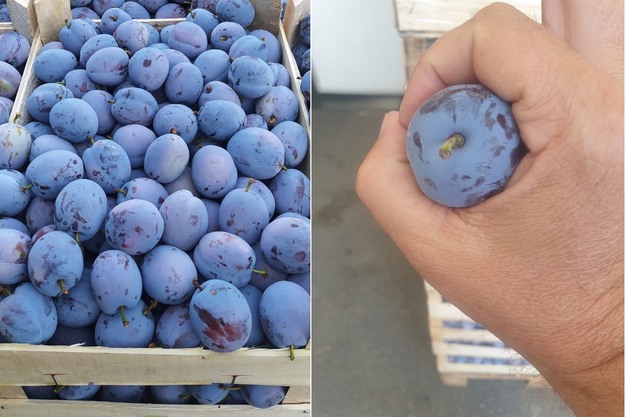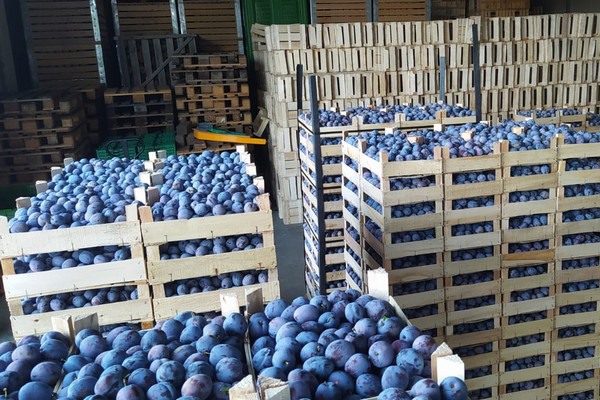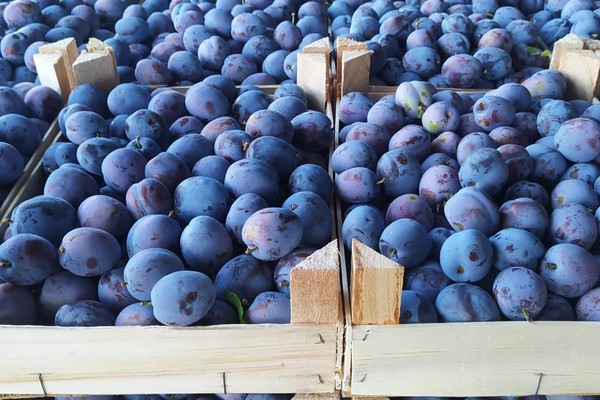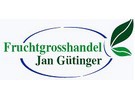It has been a plum season with highs and lows so far, reports plum importer Jan Gütinger on enquiry. "On 18 June, we were able to offer the first Serbian early plums of the Rana variety (Cacaks Frühe), the earliest ever. We then continued with Cacaks Schöne from Bosnia from the end of June, followed by Stanley. All in all, there was an increase in the number of smaller varieties in Serbia, especially at the beginning. In Bosnia, on the other hand, there was predominantly firm, stable produce until the end of the season." The Balkan season ended at the end of August, around three weeks earlier than usual.
Initially, demand was relatively high and stable. At the beginning of the German season in the second half of July, the demand for Balkan plums declined somewhat, but this has also been the case in other years, Gütinger said. "Because the German plum season also started very early, demand was rather manageable due to the holidays, which in turn led to an abrupt price reduction." At the end of July, there was a gap in the supply of Balkan plums, which was bridged with Cacak's Schöne from regional, southern German cultivation. German Top and Top Hit plums are currently on offer, followed later by the late varieties Haroma and Presenta. "I assume that German plums will be available until the end of the month."

Good start to the Moldovan season
After the end of the Balkan season, things continued seamlessly with the first Moldovan plums, which arrived in week 35. Gütinger: "The demand for Moldovan Stanley plums is already there, so the produce is meeting a receptive market. It would also be possible to source Cacak's Schöne from Moldova at the same time, but experience has shown that these do not attract much attention in the late season. Last year, we were able to offer our customers, mainly wholesale market and de-stoning companies, Moldovan/Polish plums until well into October. As things stand today, I assume that this will also be the case this year."
 © Fruchtgroßhandel Gütinger
© Fruchtgroßhandel Gütinger
Apricots, grapes, and sweet cherries
Jan Gütinger has been primarily involved in importing plums from the Balkan countries for many years. In addition to plums, he is also involved in the import and distribution of apricots for the fresh market. "This year, there were no market-relevant export volumes in either Serbia or Bosnia due to frost damage. We were offered some from Moldova, but they were too expensive. Considering the price pressure on Spanish apricots, I also see less potential in the food retail sector and more in the wholesale markets, especially for the Donaurose variety."
According to Gütinger, the same applies to grapes and sweet cherries, which he would like to offer to wholesale markets in smaller quantities in future. "I was once offered table grapes from Bosnia, but they were unsuitable for the German market due to the heterogeneous berry sizes and packaging. But you can't compare the product with the grapes that are customary on the market, such as those from Italy. However, I dare say that if you have the right varieties and the right expertise, we can build something in the future. I have also already made initial contacts with grape producers in Moldova. However, I would first like to have a look at the production on site so that we can possibly offer the first quantities next year."

Photo credit: Fruit Wholesale Gütinger
For more information:
Jan Gütinger
Fruchtgroßhandel Gütinger
Eschenweg 16
78604 Rietheim-Weilheim
Tel. +49 (0)7424 / 93 13 480
[email protected]
www.fruchtgrosshandel.net










